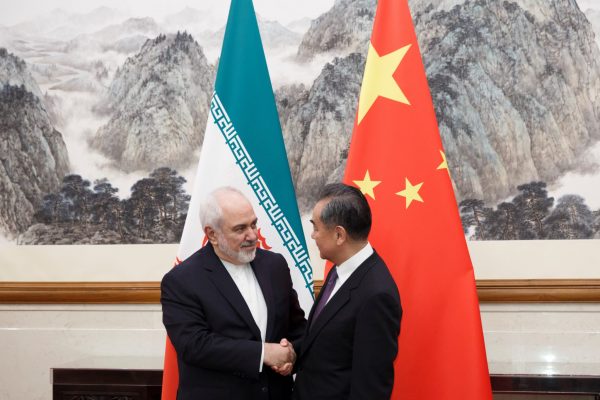Attempts to mitigate conflict are being spearheaded by European signatories to the Iran nuclear deal (the Joint Comprehensive Plan of Action or JCPOA), who remain desperate to keep Iran in the deal even as they struggle to find routes around US sanctions. Russia promises moral support to Iran, if little in the way of material backing. The other signatory, China, has remained relatively quiet over the past few weeks, but the question remains: what does the growing risk of conflagration between the United States and Iran mean for China, and what — if anything — can Beijing do about it?
Iran lies at the heart of Beijing’s geostrategic vision for the 21st century. The Belt and Road Initiative, as it is currently planned, runs through a nearly 2000 kilometre stretch of Iranian territory, linking Central Asia, West Asia, and Eastern China. Chinese infrastructure projects are dotted across Iran, from major programs like the development of the South Pars gas field to more minor projects like public transport schemes in regional cities. Iranian bazaars are awash with Chinese goods.
And even as restrictive US sanctions are reducing Iran’s capacity to sell petrochemical resources, China quietly continues to buy Iranian oil, albeit in reduced quantities and with little public fanfare.
And yet, despite the relative importance of Iran in China’s grand plans for West Asia, Beijing has limited room to manoeuvre. The relationship with the United States — for all its problems including the ongoing trade war — is simply far too important to sacrifice on the altar of a relatively small player in China’s economy like Iran. China is also deepening trade ties with other regional powers — notably Israel and Saudi Arabia, two of Iran’s local arch nemeses and staunch US allies.
It is not surprising then that the extent of Beijing’s response to the shooting down of the Global Hawk drone was to call for ‘restraint’, reiterating China’s ongoing commitment to the JCPOA and to fret about the danger of ‘opening Pandora’s box’.
If the unthinkable did happen, what would it look like and what could Beijing do? At this stage, the most likely pattern of any hostilities between Iran and the United States would be a surgical strike on Iranian defence capabilities — a move that was apparently confirmed before being abruptly called off at the last minute. Despite the presence of hawks like John Bolton in his administration, Trump seems to have little interest in putting boots on the ground. Nor does the US public have any appetite for a major conflagration.
Of course, Iran would strike back — whether directly or through proxies — and there is always the risk of a conflict spiralling out of control. Iran has threatened to close the Strait of Hormuz, a move with negative consequences for all countries shipping oil out of the Persian Gulf — although strangling such a vital route would probably result in a swift response from the United States.
That said, it is unlikely that the regime in Iran will be overthrown. Its system of theocratic governance is deeply entrenched and commands a level of popular support that, while certainly not universal, is more significant than the advocates of regime change in Washington imagine.
So what could Beijing do? As with the last few weeks, its role will likely to be to call for peace from the sidelines. Little more can be done. And yet, if anything, a strike on Iran is likely to push the wounded country ever further into the arms of China. Constricted by US sanctions, hurting from a potential air attack, and with limited effective help from Europe, the appetite for conciliation with the United States favoured by reformists in Tehran is like to evaporate — if it hasn’t already.
Forging the path ahead would then be handed over to the regime’s own conservatives and more hawkish factions who — always distrustful of the nuclear deal — will likely issue an ‘I told you so’ rebuke to reformists. With few alternatives, closer engagement with Iran’s more ‘reliable’ authoritarian partners like Russia and China is likely. Perhaps then the ultimate beneficiary of Trump’s hard-line stance against Iran will be China.
Simon Theobald is a PhD Candidate at the School of Archaeology and Anthropology, the Australian National University.

